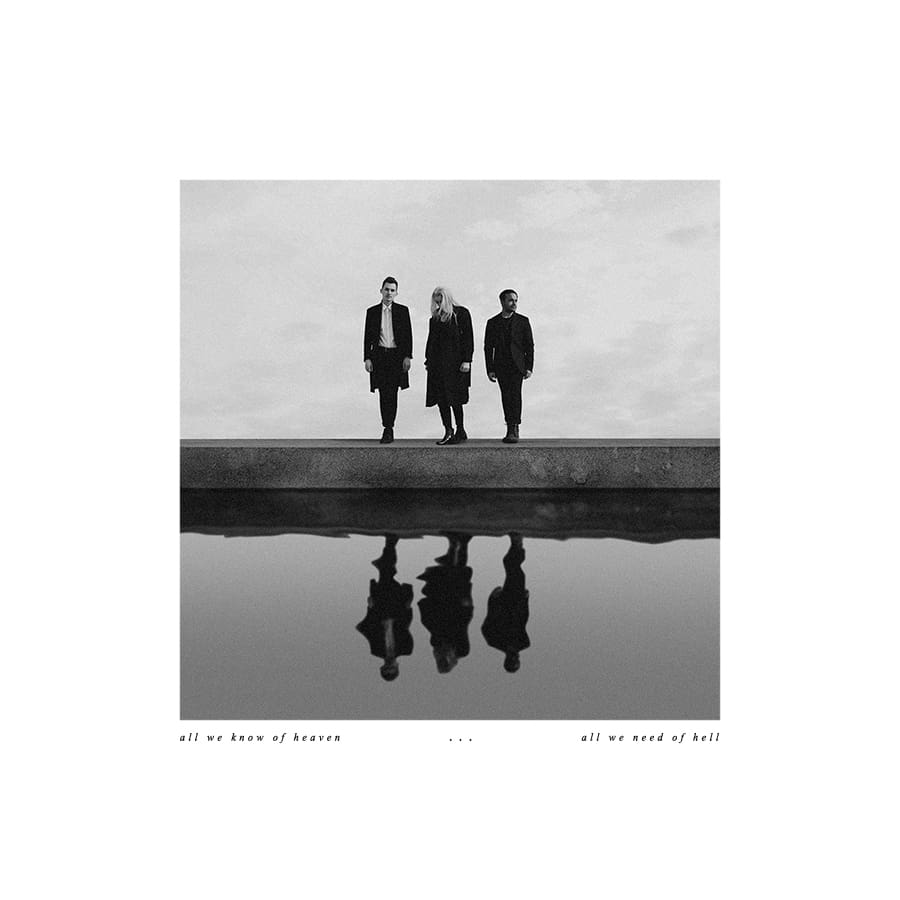The title from PVRIS‘ sophomore album is a play on the last two lines from an Emily Dickinson poem named Life. Within those two lines, therein lies a painful duality. The original line from the poem is “parting is all we know of heaven/ And all we need of hell” (7-8). Whether it be a physical or an emotional death, we tend to think of one person being released finding their heaven and those who are left behind to venture into their own personal catacombs of hell.
All We Know Of Heaven, All We Need Of Hell is an unbridled confessional of heartbreak and the downfalls that success can bring. The album begins with the very pronounced piano keys of “Heaven,” as lead singer Lynn Gunn sings of curses as a post-mortum of a lost relationship. The song builds in it’s aggression, quaint with a lone guitar chord and snaps and evolves into a torrential reflection of time lost. This is ten songs of intense reflection that both have a freedom in releasing demons and a macabre sense of tackling them. Where the music itself is a combination of dream and atmosphere, the lyrical content is very direct.
Blake Harnage returned back to the producer’s chair and helps retain the textures that made the band stand out on their debut. This album takes everything fans loved about White Noise and gives it a more, mature and full sound. The end of these songs are tailored in such a way where they have their own souls. Some have the inclusion of a dreamy harp solo, some have layered vocals that echo as if you were listening to the music within a the walls of a church cathedral. “What’s Wrong” will give fans flashes of the driving electro-rock of the previous album while “Same Soul” shows the band using a catchy, almost R&B cadence that is prevalent when Gunn is singing the chorus.
There’s also a methodical feel to it. Nothing within this music is an accident – as vocals are layered to depict emotional states like an inner tug-o-war as in “Anyone Else”. “No Mercy,” the album’s energetic and confrontational opus both uses a change from the synth from “Fire” and shows the band’s attention to detail. The last 35 seconds alone has three tempo changes before ending having you clinging on to hear more.
There are motifs that define the album’s DNA – bones, fire, blood, and touch to name a few. Gunn utilizes the description of bones to describe what the band’s aggressive touring schedule has done to her well being in both “Half” and “What”s Wrong”.
“Two years gone
Came back as some bones and so cynical
This skin don’t feel like home”
“Separate” and “Winter” are both sides of the coin as far as touch. As the slowest song on the album, “Separate” depicts how touch from a person you love can set your “nerves on fire.” “Winter” uses fire and ice to portray touch as a means of betrayal. Gunn spoke about her fight with depression and this album is a fight on two fronts – who am I during my band’s rise in popularity and and how can I rebuild my identity while mourning the lost of love. It goes back to the overall theme of the music and lyricism – in order to achieve the love you want, in both music and with a significant other, you have to be vulnerable. In that vulnerability, you have to know that what you love can also be what destroys you.
You can look throughout music and see bands that have been bitten by the proverbial sophomore jinx. The “White Noise” era was marked by a single mirror. While it had very paranormal-like tones as described by Gunn , it was both a reflection and introduction of the band’s aesthetic. The cover for AWKOH… features the band members with black clothing in a white backdrop where the reflection just a cluster of black. A mixture of loss and depression makes everything devoid of color. Through that, PVRIS were not only successful in progressing their musical form brought forth in previous works, they were able to exercise some demons in the process.
Rating: 8 out of 10


